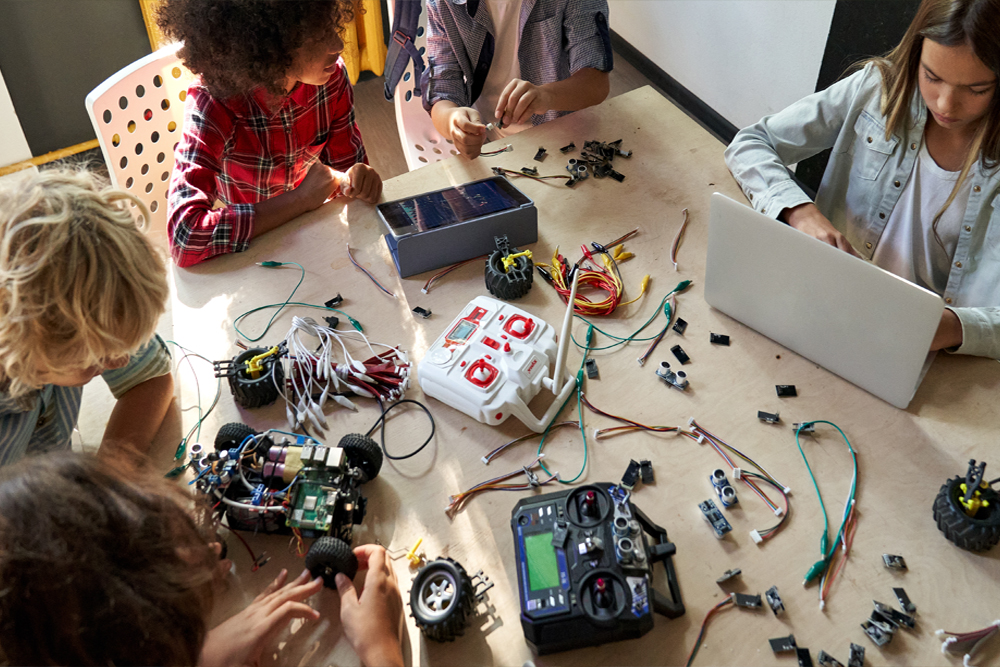The Impact of STEM on Society

STEM education goes far beyond traditional school subjects. It provides a set of skills that guide the way we think and act in everyday life. By bringing together science, technology, engineering and mathematics, STEM education helps us meet the challenges facing the world today. Let's take a look at what STEM means in a global context and how it affects the development of our society.
Preparing STEM professionals who can make a difference
STEM education gives people the skills necessary to meet the changing demands of today’s workforce. It encompasses a range of experiences and skills, with each STEM component making a valuable contribution to all-around education. Science enables students to understand the world around us in depth. It helps improve research and critical thinking. Technology prepares young people to work in an environment full of high-tech innovation. Engineering enables students to improve problem-solving skills and apply new methods to existing problems. Math allows people to analyze information, eliminate errors, and make conscious decisions when designing solutions. STEM education combines these disciplines into a cohesive system, preparing professionals who can transform society through innovation and sustainable solutions.
The STEM approach to education encourages creativity and nontraditional thinking alongside the more traditional subjects. It motivates and inspires young people to create new technologies and ideas. STEM education provides an understanding of concepts and promotes the application of knowledge. In short, its goal can be formulated into two simple actions: exploration and experience. Students are free to apply what they have learned and embrace mistakes in a risk-free environment. Project-based learning and problem solving help students develop a new way of thinking. At its core is a flexibility and curiosity that teaches students to respond to real-world challenges.
Teamwork and communication enhanced by STEM
STEM education prepares the next generation for the future. It is based on teamwork and collaboration between professionals from different disciplines. As a STEM student, you don't have to be an expert in every individual subject. Rather, you gain a mindset that allows you to become part of a highly skilled workforce that works collaboratively. Teamwork brings significant increases in productivity, job satisfaction, and salary.
Social awareness
There is a high demand for STEM skills in society. STEM education enables people to make informed decisions within the subject areas discussed. In addition, STEM skills are essential for any job as nearly all industries have some science or technology component: from essay writing services and colleges to the paper industry. This type of education enables children to grow into active citizens who can participate in STEM discussions with a strong grasp of the subject. Awareness of STEM promotes interest in a range of interesting careers. Many STEM occupations are currently in need of more industry professionals. For example, the US alone is projected to need 1 million additional STEM professionals in the near future. In addition, one of the goals of STEM initiatives is to encourage greater inclusion of women and minorities in the STEM workforce. This allows us to bridge ethnic and gender gaps. We need the involvement and participation of schools, politicians, parents, students and educators. This is the only way to continue technological and scientific progress.
Sustainable solutions to challenges
STEM subjects are focused on providing solutions to the challenges of today's society. Human history has seen years of mindless depletion of natural resources. This lack of environmental prioritization has created many challenges affecting the health and well-being of all living organisms on our planet. Our environment needs protection. Thus, sustainability has become one of the most pressing aspects studied by STEM majors. Additionally, younger generations are often more concerned about climate change than their older counterparts. Statistics show that 70% of young people aged 18 to 34 are concerned about global warming. STEM education can answer their questions. It can teach them to find the solutions they need for sustainable development. Education is a powerful tool to ensure the rise of a STEM-literate society. Educated community members can find ways to work in a competitive world. They will use sustainable practices that do not harm nature. In the bigger picture, economic and social progress is closely linked to the environment. We need to work our way towards a sustainable future. But this can only be achieved with STEM skills, experience and a multidisciplinary approach.
In summary
The world in which we live is changing rapidly and we need to keep up with it. STEM education is changing society by offering students a new way of thinking and skills that are valuable in any profession. They allow young people to be flexible, look for patterns, find connections and evaluate information. In addition, STEM education increases social awareness. It communicates global issues to the general public. STEM opportunities therefore move us towards a knowledge-based economy and increased sustainability literacy. Join the Bridge To STEM community as it develops STEM concepts and awareness in young children through its clubs and courses!











